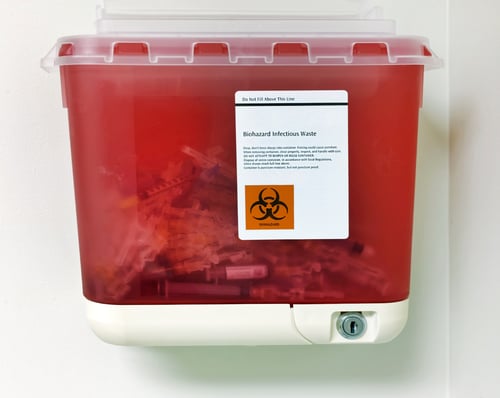As we work together collectively to contain the COVID-19 outbreak and minimize its impact, we find it of extreme importance to highlight waste management as a critical line of defense, especially in the healthcare industry.

Healthcare, research and testing facilities that are inspecting and treating COVID-19 cases need to pay extra attention to their medical waste systems in these critical times to ensure proper segregation, handling and disposal without fail.
Waste management service providers on the other hand are required to be more vigilant than ever and implement tighter measures to prevent the spread of the disease through waste streams or waste management processes.
Focus on Medical Waste
The World Health Organization (WHO) reports that it is not certain how long the virus that causes COVID-19 survives on surfaces, but it seems likely to behave like other coronaviruses. A recent review of the survival of human coronaviruses on surfaces found large variability, ranging from 2 hours to 9 days. The survival time depends on a number of factors, including the type of surface, temperature, relative humidity and specific strain of the virus.
WHO also reports that there is no evidence to date that the COVID-19 virus has been transmitted via sewerage systems with or without wastewater treatment.
These reports eliminate wastewater and to a certain extent municipal solid waste streams from the equation while the primary focus remains on the medical waste stream as a source of risk.
Consider Risk Across All Categories
Medical waste is typically segregated at the source (within the healthcare facility) and stored there for a while before taken out for disposal or in some cases pre-treatment on-site before disposal.
When segregating, medical waste is generally classified into infectious, pathological, sharps, pharmaceutical, chemical, radioactive and general waste. Different categories call for different handling, containers and labelling. For instance, highly infectious waste is usually kept in yellow autoclavable leak-proof plastic bags marked “Highly Infectious” and with the biohazard symbol. This ensures proper handling and disposal. However, general healthcare waste is kept in standard black plastic bags which don’t call for the same level of attention as the highly infectious waste.
In these unprecedented times we believe both healthcare establishments and waste management service providers should remain vigilant and consider potential risk almost equally across all categories and exercise extra care when handling all types of medical waste.
Process vs. People
The COVID-19 outbreak is proving that people can be the strongest or the weakest link in preventing the spread. Processes can only do so much when one person fails to observe a minor detail.
The medical waste management process involves identification, collection, separation, storage, transportation, treatment and disposal. All these stages are either manual or semi-automatic and involve a lot of people.
Both healthcare providers and waste management companies need to ensure the safety of the people working in the process by doubling down on preventative measures and specialized training and awareness programs.
Medical Waste Management at Imdaad
Imdaad Group is approved by Dubai Municipality for the transportation of different types of hazardous waste including medical, clinical, and pharmaceutical waste. Imdaad’s waste management division has a dedicated team and fleet for biomedical waste management carrying over 500 tons of medical waste every year which is about a quarter of the entire medical waste generated in Dubai.
The most widely used treatment for medical waste in Dubai is incineration which is handled exclusively by Dubai Municipality through its vertical combustor incineration facility with a capacity of almost 20 tons per day. The resulting ash is typically transferred to a dedicated sanitary landfill.
Imdaad’s part in the medical waste process is the timely collection of such waste from healthcare facilities and the safe transport of such waste to Dubai Municipality’s incineration facility.
In response to the COVID-19 outbreak, Imdaad has increased its preventative measures throughout the medical waste disposal process. As an example, Imdaad is disinfecting the bags before using them in the process to minimize the exposure to the virus.
Imdaad’s Response and Readiness
Imdaad Group was one of the first to develop a comprehensive response to COVID-19 across all its divisions and subsidiaries. The response included real-time preventative measures, emergency plans and training and awareness programs, all set to ensure the safety of employees and clients.
Some of these measures include:
- Awareness and prevention training on client on site and in accommodations
- Prevention and control action plans for prevention and mitigation
- Emergency response plans in line with DHA protocol
- Personal Protective Equipment at all camps and offices
- Disinfection, decontamination and deep cleaning done regularly
- Regular visits from EHSQ and HR representatives to ensure good hygiene protocol
To learn more about all the preventative measures taken by Imdaad please visit: https://imdaad.ae/covid-19-preventive-measures

